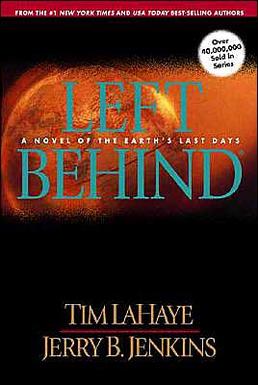(Originally posted in May, 2005.)
Left Behind, pp. 98-101
Rayford Steele is home alone. He has thrown out the bourbon and now he shuffles about grieving and, of course, fiddling with the telephone.
 We read a paragraph about the phone lines between Chicago and California. We read a paragraph about Rayford’s answering machine. We read yet another paragraph about the varieties of busy signals and their meanings.
We read a paragraph about the phone lines between Chicago and California. We read a paragraph about Rayford’s answering machine. We read yet another paragraph about the varieties of busy signals and their meanings.
The reader cannot help but wonder what this persistent motif of telephony means. Are LaHaye and Jenkins hinting at some deeper theme of the tenuousness of human communication? Perhaps telephones are a metaphor for the meaning and efficacy of prayer? Their obsession with the inner workings and failings of the phone system is too significant to be ignored, but significant of what? What does it signify?
I’m reminded of the mysterious obsession with ducts in Terry Gilliam’s delirious film Brazil. I’ve seen that movie a half-dozen times, yet the full meaning of that motif still eludes me, as does the deeper meaning of L&J’s phone motif in Left Behind. By this point in the book I find myself expecting Robert DeNiro to show up as a heroic telephone repairman.
Rayford struggles to find closure over the loss of his wife and son. L&J’s portrayal of this is wholly unoriginal, but revealing in that it contains another admission that the “Raptured” believers are, in fact, not merely missing, but dead — slain by God in a massive demonstration of divine tough love that dwarfs even the flood of Noah:
Finally he understood the bereaved who complained when their loved one was too mangled to see or whose body had been destroyed. They often complained that there was no sense of closure and that the grieving process was more difficult because they had a hard time imagining their loved one actually dead.
That had always seemed strange to him. Who would want to see a wife or child stretched out and made up for a funeral? Wouldn’t you want to remember them alive and happy as they were? But he knew better now. He had no doubt that his wife and son were gone as surely as if they had died, as his own parents had years before. Irene and Ray would not be coming back …
He longed to be able to see their bodies, at least — in bed, in a casket, anywhere. He would have given anything for one last glimpse. It wouldn’t have made them any less dead to him, but maybe he wouldn’t feel so abandoned, so empty.
Rayford knew there would not likely be phone connections …
And so poor abandoned Rayford putters around his empty house. He collects the nightclothes Irene and Ray were wearing when they died and carefully folds them and stores them in a box. He eats the last of the cookies his late wife had baked before she died. He tries, repeatedly, to contact his surviving daughter on the telephone, to comfort her and be comforted by her in the wake of all this death.
Yet even as they concede this unavoidable point, acknowledging that Irene and Raymie could not be “any less dead,” L&J still try to qualify what they’re saying. “As surely as if they had died,” they say, clinging desperately to that “as if.” Rayford’s dear departed aren’t really dead, they insist, only dead-like. They’ve been taken to heaven but not, you know, taken to heaven taken to heaven. One half-expects to read that Rayford’s wife and son are only “pining for the fjords.”
The distinction between dead and dead-like is immaterial. It does not matter to Rayford and it does not matter to Irene and Raymie. But it is desperately important to LaHaye and Jenkins. It is central to the appeal of their Rapture theory. “Sinners die, but Christians fly” is the core of what they believe.
The prospect of sudden, inevitable, unknowable death terrifies them, and so everything the scriptures say about death is reinterpreted. Paul’s great sermons on the hope of resurrection are twisted into discussions of what happens instead of death, rather than after death. Jesus’ intentionally frightening warnings of “a thief in the night” are drained of all dread. And Christians are reassured of a seamless transition to eternity without ever running out of time.
The fear of death is discussed in this week’s “Left Behind Prophecy Club” newsletter for fans of the series. This week’s Q&A deals with the question, “Is fear of death normal?” Mark Hitchcock, a “nationally recognized prophecy author and speaker,” answers that fear of death is common, but misguided.
Hitchcock’s answer is not concerned with “… the dread of something after death, / The undiscover’d country from whose bourn / No traveller returns.” Nor is he concerned with the dread of nothing after death. Instead, he says, “the real issue lurking behind most fear of death” is “the prospect of accountability or standing before God.” In other words, he’s not talking about the fear of death at all, but about the fear of Hell. And so, because real, true Christians aren’t headed to Hell, real, true Christians don’t need to fear death.
The apostle Paul also told Christians they didn’t need to fear death, but he arrived at that point more honestly — only rejecting the fear of death after walking through the valley of its shadow. So when we read Paul rejecting the fear of death (or when we read, say, Margaret Edson quoting John Donne quoting Paul quoting Hosea) we encounter a courage and a power that the Left Behind Prophecy Club can’t offer its members.
Hitchcock’s answer relies on the Christian belief that Christ died for us, but for him, as for L&J, this means that Christ died not just on our behalf, but in our stead. Like LaHaye and Jenkins, Hitchcock’s main hope is not in resurrection, but in avoiding the need for it by being whisked off to heaven without ever dying.













